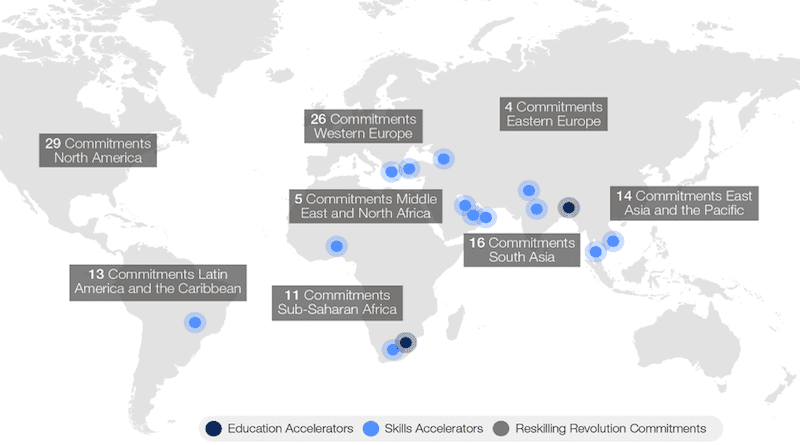Reskilling Revolution: 350 Million People Reached With Future-Ready Skills, Education And Jobs
The World Economic Forum Tuesday announced that more than 350 million people are being reached with better skills, jobs and education through commitments made as part of its Reskilling Revolution initiative, three years after launching at its Annual Meeting in Davos. Working with more than 20 governments, 60 global chief executives and a network of over 350 organizations, the Reskilling Revolution is preparing 1 billion people for tomorrow’s economy and society by 2030.
To date, 310 million people are being reached through 110 commitments made by businesses and governments, representing innovative and best-in-class education and workforce skilling initiatives. An additional 40 million people are being reached through a network of national Skills and Education Accelerators in Bahrain, Bangladesh, Brazil, Cambodia, Georgia, Greece, India, Nigeria, Oman, Pakistan, South Africa, Turkey and the United Arab Emirates. At this year’s Annual Meeting in Davos, Italy announced its intention to collaborate on establishing an Education Accelerator.
From LinkedIn and Microsoft’s commitment to train and certify 10 million additional learners in essential tech roles while helping 80 million others learn new skills for digital roles since the start of the COVID-19 pandemic, to iamtheCODE’s pledge to train 1 million women and girls as coders across Africa and globally by 2030, the Reskilling Revolution is tackling the global skills gap through a wide range of innovative commitments.
“With 1.1 billion jobs likely to be radically transformed by the Fourth Industrial Revolution, supply chain shifts and the energy transition, workers need support on reskilling and upskilling, while the younger generation needs future-ready education. The Reskilling Revolution is bringing together government, business and educators to drive this transformation,” said Saadia Zahidi, Managing Director, World Economic Forum.
Coinciding with the three-year anniversary of the initiative’s launch, members of the Reskilling Revolution are convening this week at the World Economic Forum Annual Meeting in Davos-Klosters, Switzerland, to evaluate impact and progress achieved as well as agree on next steps for priority action. The Education 4.0 Alliance, a multistakeholder group advancing global education reform and more inclusive and innovative learning environments, will also be meeting and launching a new interactive education 4.0 taxonomy and unveiling 16 finalists selected as education lighthouses, examples of the most innovative and forward-looking education initiatives.
From Education and Skills to the Jobs of Tomorrow
Leaders of the Jobs Consortium are using this week’s Annual Meeting to propel initiatives to create good jobs, enable transitions between these jobs, improve the quality of jobs and wages and generate better foresight on emerging jobs.
While technological shifts, geo-economic pressures, demographic changes and the green transition are creating jobs and skills churn, there is also opportunity for new job creation. A new World Economic Forum analysis, in collaboration with Accenture, finds that an additional 76 million jobs in green and social sectors are needed by 2030 in 10 economies alone: Australia, Brazil, China, Germany, India, Japan, South Africa, Spain, the United Kingdom and the United States.

